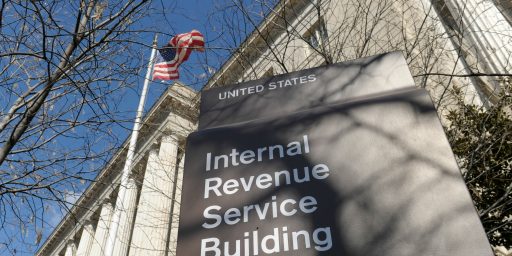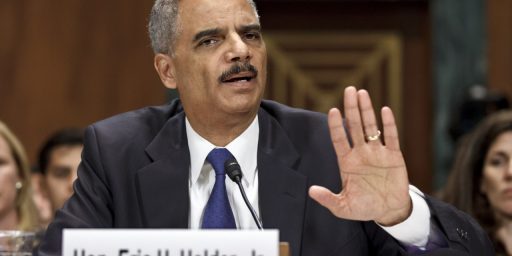Criminal Liability Of IRS Workers In Targeting Scandal Unclear
We’re already hearing politicians talking about putting the IRS employees accused of targeting conservative organizations out of political bias in jail. However, as Aaron Blake notes, it’s unclear whether they actually broke any laws:
In short: We don’t know yet. But it’s also quite possible that nobody will ever be convicted of breaking the law in the IRS scandal.
“I am not aware of any statute that prohibits IRS targeting of applicants,” said Republican lawyer Jan Baran, who served as general counsel to George H.W. Bush and the RNC. Other politically inclined lawyers agree.
Essentially, there are three types of laws that might conceivably have been broken, as Attorney General Eric Holder acknowledged in his testimony before a House committee Wednesday:
1) Civil rights laws that protect people from being discriminated against by the government
2) The Hatch Act, which prevents civil servants from engaging in partisan political activity
3) Perjury laws, which prevent people from lying to Congress
For the third law to have been broken, Republicans would have to prove that IRS officials knew of improper targeting of conservatives and testified to the opposite effect. They have noted that then-IRS commissioner Douglas Shulman testified in March 2012 that there was no such targeting going on.
But for that to be perjury, Shulman would have had to know that he was lying. Miller admitted Friday that Shulman was wrong but suggested he wasn’t aware of the targeting.
“It was incorrect, but whether it was untruthful or not … ” Miller said, tailing off. He later added: “To my knowledge, I don’t believe he knew at the time.”
As for the first two laws, it likely would have to be proved that the staff members involved in targeting the conservative groups were deliberately doing so for political purposes.
“You would want some direct evidence of intent, that people knew what they were doing was wrong and they decided to do it anyway,” Nathan Hochman, a former assistant attorney general in the Justice Department’s tax division, told Bloomberg News.
(…)
It may seem self-evident that the motivation was political, but proving that in a court of law is another matter entirely. And until that political motivation is proven, it will be tough to land convictions under the first two laws mentioned above.
That’s also why we’re seeing such a concerted effort from the IRS to emphasize that it was about incompetence rather than politics.
Proving intent is obviously the most difficult thing here. The fact that there appears to have been a disparate impact on conservative organizations does tend to make one question the idea that this was all simple incompetence, but it’s not likely to be sufficient for a criminal trial. In the end, despite the calls, we may end up with nobody going to jail at all.






Bobby Jindal has joined the kangaroo chorus. Due process? We don’t need no stinking due process…
Why wouldn’t it fall under #2, the Hatch Act? Why else would they do such a thing?
Of course it is. The bureaucracy works very hard to avoid accountability. If some personal profit could be shown, then there are avenues to go after these individuals. That is very personal, if their actions were to advance once party’s agenda, then it goes back into cover.
But bureaucrats doing evil or even just wrongfully treating a citizen, then that is not accountable. Think about it, if bureaucrats could be held accountable for their incompetence, the government would shut down. If they could be held for official actions wrongfully targeting citizens, then that accountability might go rather high in the bureaucracy.
No, accountability if for private sector actors. Government employees and managers cannot be held to the standard of the private citizen. That’s crazy talk, think of the inhibitions on government employee actions if they could actually be called to task. Heck, ignorance of the law is no excuse unless you are a government employee then it is qualified immunity.
But, of course, government employee are of higher caliber than mere citizen and should not be held to the standards of conduct of the hoi polloi, who must be controlled by the “betters”.
Right. Just look at how people like former WAMU CEO Kerry Killinger was held accountable for encouraging the most predatory forms of lending leading up to the real estate crash, and the subsequent disaster for homeowners, investors, employees, and just about everybody else.
Why the man was forced out of his job with just over 100 million in his bank account!
The double standard for guys like Killinger and low/mid level government employees is shocking indeed.
.
They’ll never get either criminal or civil liability. For criminal liability the IRS folks can always plead incompetence. That will be completely convincing.
Federal law shields them from civil liability. Sovereign immunity will shield the federal government itself.
@anjin-san: Who should have held Killinger accountable?
26 USC § 7214:
Yes, that’s right, put them all in jail. Who cares about getting facts first to see if anyone broke any laws. If anyone needs to go to jail it’s the whole Republican Party for reasons of claiming they’re actually sensible people! When by majority of their actions the lot of them are totally off their rockers!!
To @Dave Schuler’s points, it’s hard to see criminal charges sticking. Much like the corporate form, the very structure of the IRS insulates those involved from criminal liability in cases like this.
As far as a Civil Suit, I have two questions for the lawyers in the audience (my in house counsel didn’t know the answer to these):
1. What civil protections extend to groups? Again these were group, not individuals, who were applying for 501(c)3/4 status. So how — if at all — does that change the equation?
2. What type of damages could they actually sue for? Obviously they can sue for compensation of the time and resources that went in to filling out the questionnaires. But beyond that, what damages could they alleged?
Again, 501(c)4 filing — at least — is optional. And the applicants could continue to operate as a 501(c)4 during the entirety of the filing process. Further, status is retroactive (at least to the date of filing).
2a. Is it fair to say that the groups who withdrew their applications due to the questioning/cost of following up) have the strongest case for damages?
Where, oh where was Mr. Jindal when the Bush administration invented “free speech zones”?
Well, none of bankers who broke the world economy five years ago and who screwed over billions of people have gone to jail, so I’m not surprised that some IRS folks who haven’t really hurt anybody probably aren’t going to jail either.
Sometimes our right wing friends have no sense of proportion.
@Scot: “Why else would they do such a thing? ”
Because there was suddenly a huge flood of applications from Tea Party groups, and some were clearly not eligible, so some employees decided to focus extra attention on other Tea Party groups?
It’s pretty to see other scenarios if you take off the tinfoil…
@JKB: “But bureaucrats doing evil”
Yes, asking extra questions before granting a group a tax break is the definition of evil. I’m surprised you haven’t started shooting yet.
@JKB: “No, accountability if for private sector actors.”
Yes, it’s tragic the way Texans lynched the execs at the fertilizer plant that blew up and destroyed an entire neighborhood because they were illegally storing dangerous materials and lying about it.
Oh, wait, no one’s done anything to them yet? Never mind.
@wr
That plant was inspected as recently as 1985. WTF do you liberal sissies want? A bureaucrat on every street corner?
@wr: Well I guess that’s possible but if the employees are half as bitter as you seem to be, I find it doubtful.
@Dave Schuler: and the sgt shultz act will protect the rest!
Free speech zones? Bankers? I thought we were talking about IRS malfeasance here.
Besides it’s all a moot point. The person in charge of the department has been appropriately disciplined — and by disciplined, I mean given hefty bonuses and promoted — so it’s all settled now. Move On. Nothing to see here.
And once again, we see the same knee-jerk reaction — no matter the provocation, the first impulse is to discredit the accusers, not address the accusation. There’s an assumed “you must be this pure” standard before any complaints can be heard — and the standard is, of course, impossibly high.
And as noted over at Ace of Spades, there is a simple answer to “what crimes were broken” — pending applications were released in direct violation of confidentiality laws. Also, on at least one occasion, it is obvious that a high-ranking Obama official was given access to and released confidential tax records (Austan Goolsbee and the Koch Brothers).
What’s the current version of “third-rate burglary” and “that statement is no longer operative?”
@wr: Yes, it’s tragic the way Texans lynched the execs at the fertilizer plant that blew up and destroyed an entire neighborhood because they were illegally storing dangerous materials and lying about it.
If you want to go completely off-topic (and that does seem to be your wont), which was more recently inspected for safety — the Texas plant, or Kermit Gosnell’s charnel house?
@Jenos Idanian #13: I don’t know. Since both were in states with Republican governors, and Republicans think anyone who calls himself a “businessman” should be free to kill as many citizens as possible as long as there’s profit at the end, I’m not sure what difference it makes.
Oh, except that Gosnell killed one at a time, so he’s in prison. The execs in Texas are counting their bonuses.